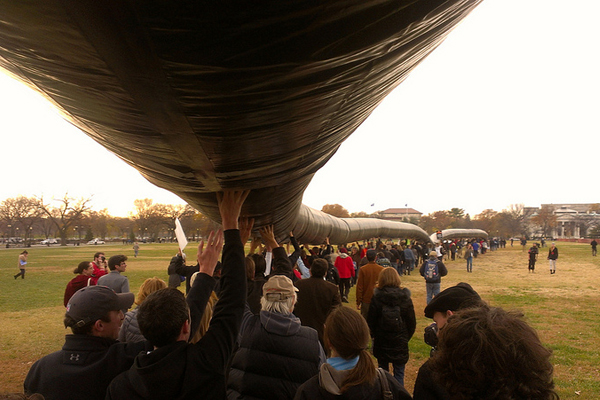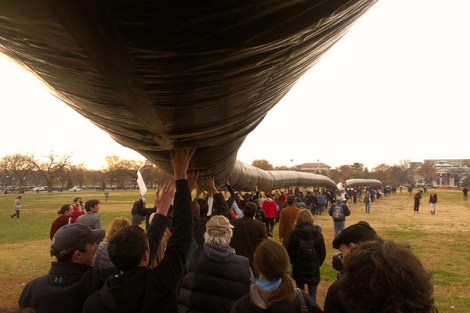And it’s official: The debate over the Keystone XL pipeline is back.
Yesterday, several thousand people protested outside the White House in a scene echoing the regular protests that made headlines last year. Led, as always, by activists from 350.org, the protest was intended to increase pressure on President Obama to deny permit approval to the pipeline. If approved, Keystone XL would dramatically increase the amount of tar-sands oil TransCanada ships from Alberta, Canada, to American refiners, perhaps even making the risky endeavor of tar-sands drilling profitable in one fell swoop.
From The Guardian:
“It’s no longer sort of a rag-tag bunch of kids — it’s the very heart of the environmental movement,” said Bill McKibben, president of 350.org, who helped lead the protest. …
Obama put the pipeline on hold in January, citing the need to review environmental concerns with a portion of the route in Nebraska.
TransCanada changed its route and reapplied for the permit. Nebraska’s state government is expected to approve the new route by the end of the year, and Keystone proponents have urged the Obama administration to grant the permit soon afterward.
Nebraska recently presented results from its initial assessment of the new Keystone route, suggesting that it greatly reduced the risk to the critical Ogallala Aquifer.
As you’d expect, there is pressure coming from the other side of the issue as well. Late last week, a group of senators requested a meeting with the president to discuss the issue. From The Hill:
In a letter to the president, sent Friday, a group of 18 senators urged Obama to create thousands of jobs by approving the pipeline, which would transport oil from Canada through the United States for processing at refineries in Texas and Louisiana.
“Setting politics aside: Nothing has changed about the thousands of jobs that Keystone XL will create,” the letter stated. “Nothing has changed about the energy security to be gained through an important addition to the existing pipeline network built with sound environmental stewardship and the best modern technology. Nothing has changed about the security to be gained from using more fuel produced at home and by a close and stable ally. And nothing has changed about the need for America to remain a place where businesses can still build things.”
Actually, several factors have changed, but we don’t need to get into that again. We’ve also previously written about how Montana’s two senators, who support the pipeline (and signed the letter), control 2 percent of the U.S. Senate, even though they only represent 0.3 percent of the American population.
No one knows how Obama will make his decision about the Keystone permit. But both opponents and proponents have arguments to cling to. Pipeline opponents can embrace the idea that Obama has regularly argued against climate change rhetorically and made big albeit subtle strides toward addressing it in his first term. Proponents can simply point to the president’s words from last week:
There’s no doubt that for us to take on climate change in a serious way would involve making some tough political choices and understandably, you know, I think right now the American people have been so focused and will continue to be focused on our economy and jobs and growth that if the message somehow is that we’re going to ignore jobs and growth simply to address climate change, I don’t think anyone’s going to go for that. I won’t go for that.
This, then, is the debate: Will Obama be convinced that the (inflated) assessments of job creation will outweigh the possible environmental damage — and, it’s worth noting, the potential for economic disruption from augmented climate change?
Time will tell.





